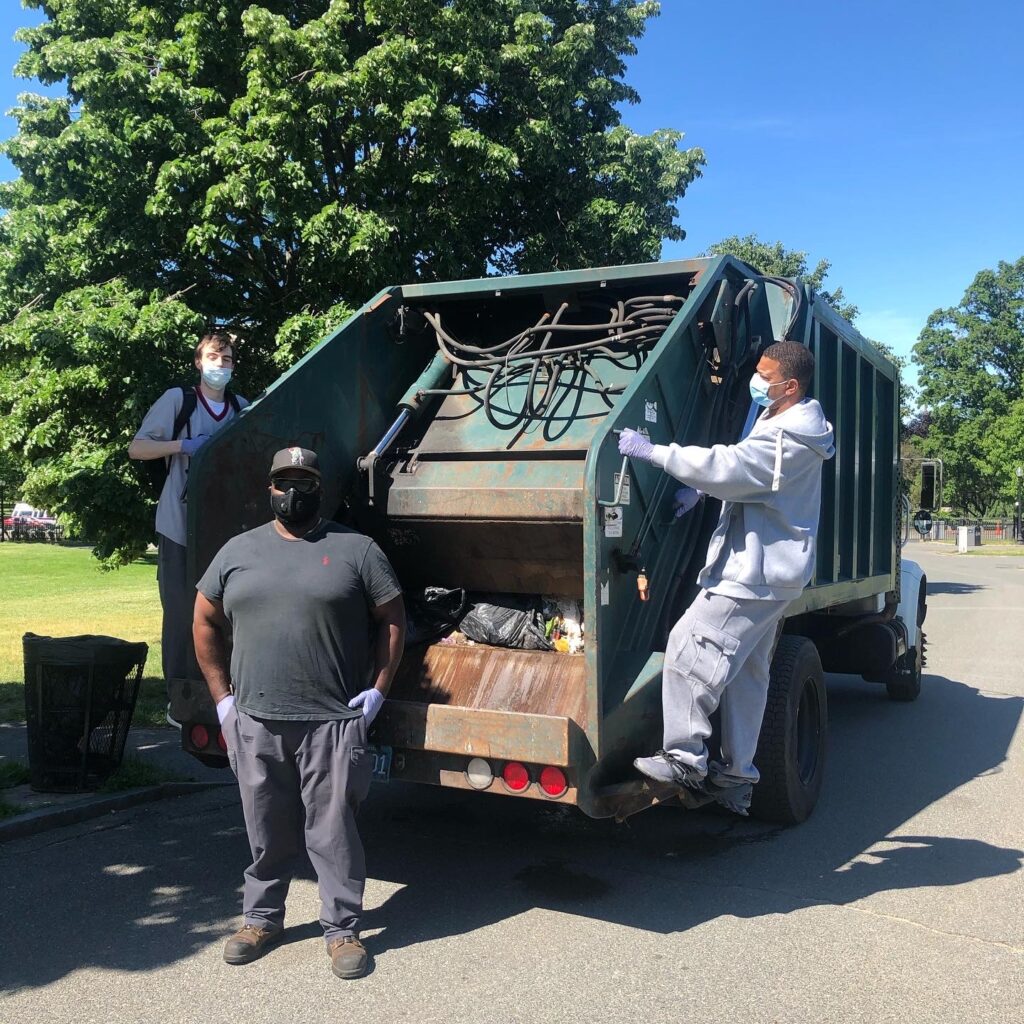Christ We Proclaim in the Globalized City
 My Conference Theme
My Conference Theme
Discipling the Globalized City: Our Savior’s
Great Commission Provision
Monday Morning:
A History of the City
Faith Baptist Bible College and Theological Seminary
2017-10-30
Above is a picture taken on top of the Olympic Tower in Beijing China. Beijing, a city of 40 million people, is in need of the gospel. Although there are thousands of house churches in Beijing, many of these actually consist of non-Christians gathering together without an understanding of salvation. Even the Christian house church in Beijing is in great need of solid teaching. What is true of Beijing is true of cities all over the world—the gospel is hardly present. Now that over 50% of the population of the world live in cities, it is becoming even more important for the Christian church to effectively minister the gospel in the city. This series of messages were presented to Faith Baptist College and Theological Seminary for the purpose of engaging Christian individuals and institutions in a globalized-city (a city of at least one million which is globally connected) church-planting movement.
The FBBC and TS conference theme was, Christ We Proclaim, which I modified to Christ We Proclaim in the Globalized City. But my theme for this series of messages was actually, Discipling the Globalized City: Our Savior’s Great Commission Provision. My theme communicates my conviction that the city has always been a major means of making God known globally. Yet the city has been mostly abandoned by the Christian church. While the rural area and suburbia has been the focal point for church planting, larger cities have languished. As we will see in these three messages, this non-globalized-city focus is not wise for Great Commission Christians to follow. The way the globalized city functions makes it the place Christians must engage for the gospel’s sake. These messages will explain why.
In-order to effectively obey our Savior’s command to make disciples of all nations
We must grasp the importance of the Globalized City …
- By rethinking the first city Although most assume that cities have been evil from the beginning, I believe cities were originally designed to transmit the image of God throughout the inhabited world, and that, even in their fallen condition, cities remain the most strategic place to do Great Commission ministry.
An anti-urban bias:
Missiologist Conn and Ortiz have written on the anti-urban bias,
After all, goes the argument, didn‘t the downfall of Lot, Abraham‘s nephew, begin when ̳he pitched his tent near Sodom, (Gen. 13:12)? And didn‘t Lot‘s path to the city (Gen. 13:11) trace the eastward path of Adam and Eve, Cain and the Babel builders—always away from the presence of God (Gen 3:24; 4:16; 11:2). Conn and Ortiz, Urban Ministry, 85
However, there is ample reason to believe that cities were the creative intention of God. Although the first city mentioned in the Bible was made by an evil man, it was not necessarily the first city in existence.
Genesis 4:17 Cain 1had relations with his wife and she conceived, and gave birth to Enoch; and he built a city, and called the name of the city Enoch, after the name of his son.[1]
This passage only reveals that Cain built a city, but the text does not indicate that this was the first city.
Genesis 1:26-28 26 Then God said, “Let Us make man in Our image, according to Our likeness; and let them rule over the fish of the sea and over the birds of the sky and over the cattle and over all the earth, and over every creeping thing that creeps on the earth.” 27 God created man in His own image, in the image of God He created him; male and female He created them. 28 God blessed them; and God said to them, “Be fruitful and multiply, and fill the earth, and subdue it; and rule over the fish of the sea and over the birds of the sky and over every living thing that moves on the earth.”[2]
The constitution of man as a social being is best experienced in the city. We are made in the image of the triune God and are therefore social beings. Built into us is the need to interact socially. It is hard to imagine our ancestors moving as far away from each other as possible when they were made to be socially interrelated.
Obeying the cultural mandate surely demands a city. As social beings we were given the responsibility to rule over the affairs of the earth and to subdue the global activities of the earth. Even in our globally connected contemporary world, businesses and governments see the need to do business in person—face to face. How could it be possible for the ancient world to manage the world if managers didn’t meet together in early cities.
Romans 13:1-7 Every person is to be in subjection to the governing authorities. For there is no authority except from God, and those which exist are established by God. 2 Therefore whoever resists authority has opposed the ordinance of God; and they who have opposed will receive condemnation upon themselves. 3 For rulers are not a cause of fear for good behavior, but for evil. Do you want to have no fear of authority? Do what is good and you will have praise from the same; 4for it is a minister of God to you for good. But if you do what is evil, be afraid; for it does not bear the sword for nothing; for it is a minister of God, an avenger who brings wrath on the one who practices evil. 5 Therefore it is necessary to be in subjection, not only because of wrath, but also for conscience’ sake. 6For because of this you also pay taxes, for rulers are servants of God, devoting themselves to this very thing. 7Render to all what is due them: tax to whom tax is due; custom to whom custom; fear to whom fear; honor to whom honor.[3]
Human Government, ordained by God, seems to indicate the need for cities.
Revelation 21-22
Mankind’s salvation is fully realized in an eternal city called Jerusalem, which indicates that the city, as man’s dwelling place, has always been God’s design.
Implications:
The world that might have been would most certainly have been an urban world. The human race was created in a garden, but their [sic] destiny as God‘s image-bearers and as social beings lay in the city. Moreover, the cultural mandate which God gave Adam (Gen. 1:28) implied, even required, city building. Adam was commanded to cultivate the earth‘s resources and build with the things placed at his disposal. He was to organize and govern, under God, the world God had made. The unfallen community would have expanded from the nuclear family to the extended family to the whole human race, and cities would naturally have resulted. Greenway, ―Framework for Urban Missions‖, 26.
To this I would add that not only would life in the unfallen world result in cities, but even fallen cities are still meant to be the major way in which God intends to make Himself known in the world. Not only does our social nature and divine responsibilities indicate a need for cities, but the fact that God has ordained human government and that God’s resolution of man’s alienation from Him will happen in the city all strongly indicate that cities are God’s place of blessing.
In-order to effectively obey our Savior’s command to make disciples of all nations
We must grasp the importance of the Globalized City …
- By understanding the City in History (The history of the city culminates in God’s greatest blessing to the world.)
Secular History
Family Cities (The city is centralized around the priestly father.)
Shrine City States (The worship of God degenerates into the worship of gods, but worship is the integrating feature of civilization)
Urban Empires 2,400 B.C. – 400AD (The city continues to degenerate, but it is also used by God to spread the gospel.)
Feudal and Commercial Cities (Because of unholy alliances with commerce, the church lost its authority, and Renaissance thinking filled the vacuum, which erodes civilization, but the reformation transformed cities and provided a good foundation for city ministry.
The Industrial City Because the Industrial Age was primarily developed within the intellectual context of the Renaissance, the industrial city tended to have a dehumanizing effect upon civilization. On the other hand, it was during this era that cities became much more connected and therefore, important for the movement of the gospel.
The Modern City The size and connectedness of cities explode.
Babylon and Jerusalem The ultimate battle to destroy humanity is waged from a city, and the ultimate victory is celebrated in the city.
It is not my intent to describe in detail the city in history, but let me ask this question, Could a world history be written, without talking about the city? I don’t think so. In fact history seems to be centered in the city. It is the city where history happened. The city has always been the place or influence. Power has been concentrated in the city and global power in globalized cities. This is very nature because all things must happen with communication and communication best happens in close proximity.
Biblical History
Cain-Lot-The city of tents, David and Jerusalem, Nineveh, the captivity, Jesus in the Temple, Jesus weeps, Jesus crucified, The church begun, Paul’s mission strategy, the Epistles, Babylon and Jerusalem
One can’t tell the story of the Bible without continually referencing the city. All of history seems to emanate from the city. This is because image bearers dwelling together make good or bad things happen depending upon their submission to God.
Conclusion: The city has always been the primary battlefield for the salvation of mankind.
In-order to effectively obey our Savior’s command to make disciples of all nations
We must grasp the importance of the Globalized City …
- By appreciating the globalized city (It is my conviction that the globalized city has been provided by our Savior for the purpose of doing the Great Commission.)
- The World in Malden (40% foreign born) I live in Malden, which is part of urban Boston. The Malden high school has 60 different language groups represented. Also, the New England Immigrant Center, which is located in Malden, has several hundred immigrants on a waiting list to learn conversational English. A neighborhood park near our home is populated daily with families from all over the globe. It is not unusual to be the only Caucasians at the part. One need not leave our Malden community to have a worldwide ministry.
- The World in Boston (within 30 minutes of our home) Boston is a globally connected city. There are at least 35 institutions of higher learning in Boston. Many of these have many countries represented (Boston University has 131 countries represented in the college and Scholars come from 88 other countries). Boston also has large immigrant communities with over 25% of its residence being foreign born. In addition to this, Boston is an international business and tourist center.
When one studies Boston, one with Great Commission eyes quickly understands that places like Boston seemed designed to help one actually do the Great Commission.
A quote from Missiologist John Massey
The Church can view globalization as ultimately God’s doing. He is moving peoples into the megacities of our world.” and “Missions strategy is no longer primarily focused on reaching nations within their geographical boundaries, but now seeks to reach displaced peoples living and working in different countries.
God has brought the world to the doorstep of the American church, and other evangelical communities across the world, in order that we might proclaim the gospel of Jesus Christ to them. Many mission agencies still operate on strategies to reach rural, monocultural peoples, but God is bringing peoples to the megacities of the world. These cities demand strategic attention.” and “If the sovereign God has brought the peoples of many nations to the cities with a strong Christian presence, then one must conclude that God’s providence has brought us into existence, so that we might reach the nations in our own backyard. His sovereign working mandates our seizing the opportunity that he has created for his people. The choices before the church are simple: (1) Will we rely on formulas and strategies without reference to the sovereign and surprising work of God? (2) Will we misinterpret the teaching of God’s sovereignty over all to lead us to indifference or fatalism? (3) Will we understand the clear connection in the Bible of God’s sovereignty and his call to his people to make disciples of all nations, beginning in our communities and cities?
The globalized city is God’s provision for Great Commission ministry. Therefore, we must follow our Savior into the city in order to minister the gospel to the world in the city.
Invitation: We must Know God’s intention for the city-Recognize our stewardship-Yield to our responsibility
1 Lit knew
[1] New American Standard Bible: 1995 update. (1995). (Ge 4:17). La Habra, CA: The Lockman Foundation.
[2] New American Standard Bible: 1995 update. (1995). (Ge 1:26–28). La Habra, CA: The Lockman Foundation.
[3] New American Standard Bible: 1995 update. (1995). (Ro 13:1–7). La Habra, CA: The Lockman Foundation.




 My Conference Theme
My Conference Theme